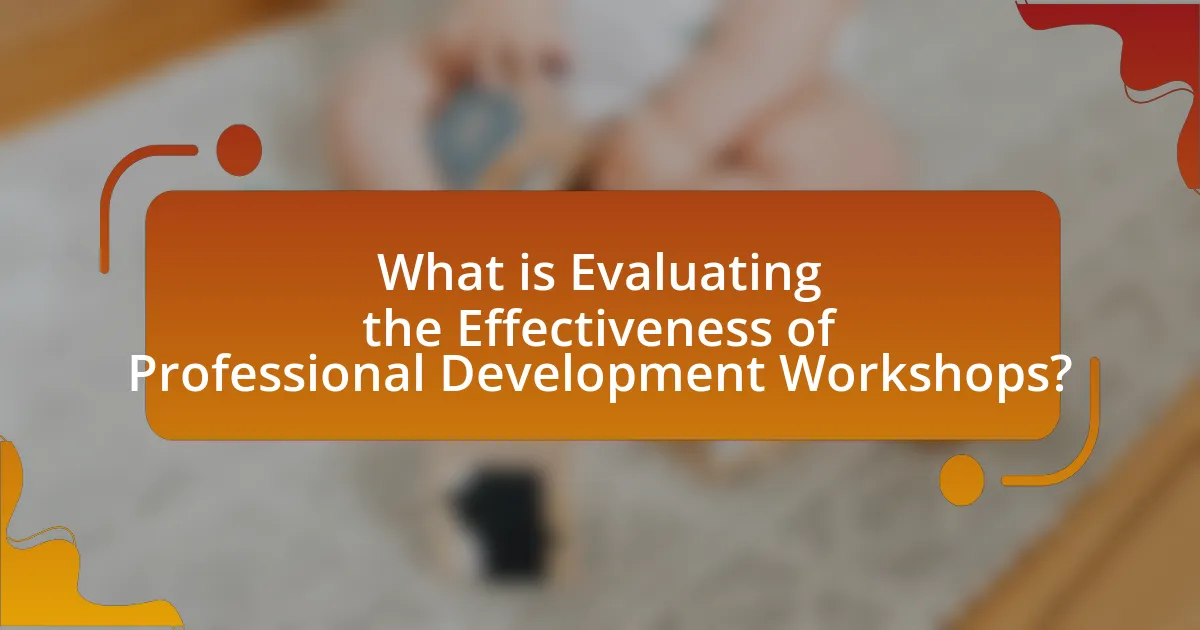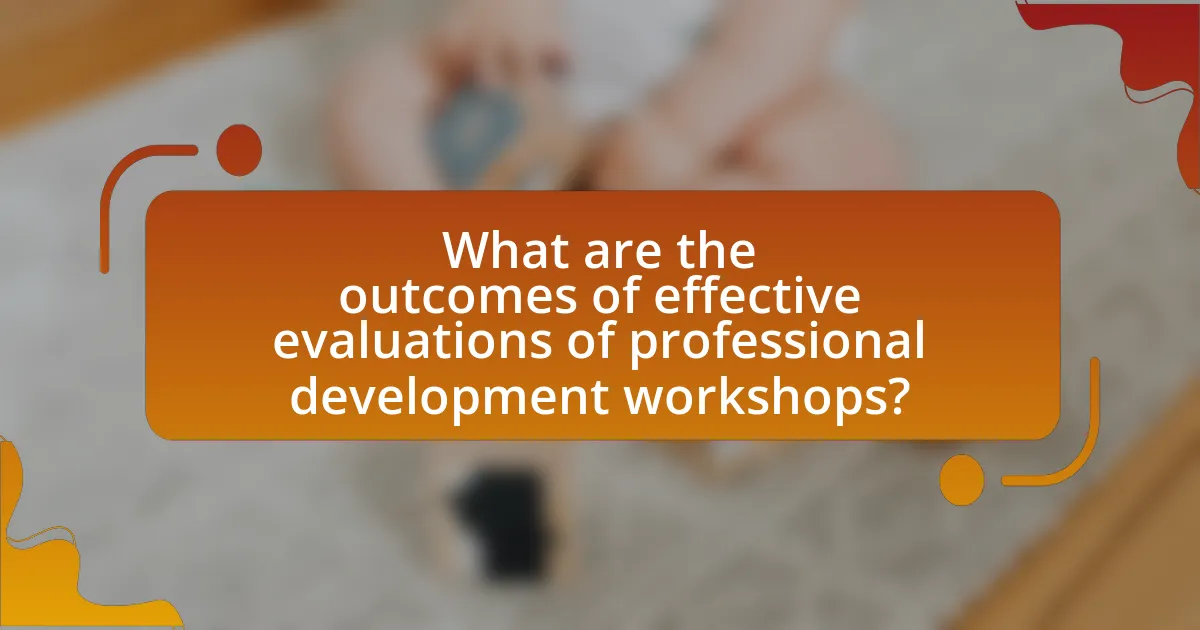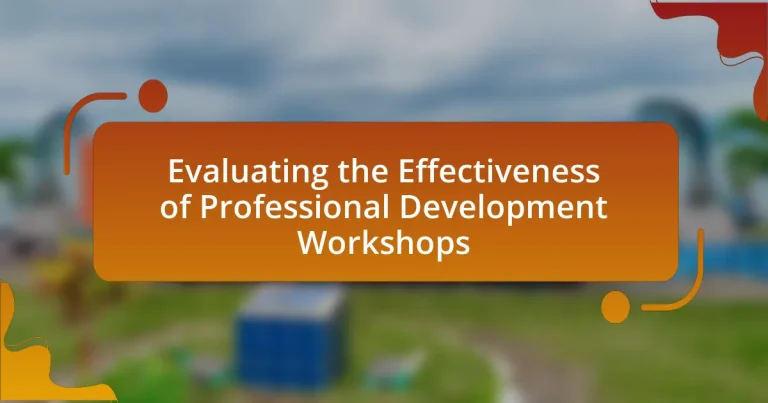Evaluating the effectiveness of professional development workshops is essential for assessing how well these programs meet their goals and enhance participants’ skills. This evaluation process includes measuring participant satisfaction, knowledge retention, and the application of skills in the workplace. Key criteria for assessment involve participant feedback, learning outcomes, and behavioral changes, while common evaluation methods include surveys, assessments, and observations. Effective evaluations not only inform future workshop designs but also contribute to improved organizational performance and participant satisfaction, highlighting the importance of systematic feedback and data-driven insights in professional development initiatives.

What is Evaluating the Effectiveness of Professional Development Workshops?
Evaluating the effectiveness of professional development workshops involves assessing how well these workshops meet their intended goals and improve participants’ skills and knowledge. This evaluation typically includes measuring participant satisfaction, knowledge retention, and the application of skills in the workplace. Research indicates that effective evaluation can lead to improved workshop design and better outcomes for participants, as evidenced by studies showing that structured feedback mechanisms significantly enhance learning experiences and professional growth.
Why is it important to evaluate professional development workshops?
Evaluating professional development workshops is crucial to ensure they meet the learning needs of participants and achieve desired outcomes. This evaluation process helps identify the effectiveness of the content, delivery methods, and overall impact on participants’ skills and knowledge. Research indicates that organizations that regularly assess their professional development initiatives can enhance employee performance and satisfaction, leading to improved organizational outcomes. For instance, a study by the American Society for Training and Development found that companies that invest in employee training see a 24% higher profit margin than those that do not. Thus, evaluation not only informs future workshop design but also contributes to the overall success of professional development efforts.
What criteria are used to assess the effectiveness of these workshops?
The criteria used to assess the effectiveness of professional development workshops include participant feedback, learning outcomes, and behavioral changes. Participant feedback is gathered through surveys and evaluations to gauge satisfaction and perceived value. Learning outcomes are measured by assessing knowledge retention and skill application through pre- and post-workshop assessments. Behavioral changes are evaluated by observing the implementation of new skills in the workplace, often tracked over time to determine long-term impact. These criteria provide a comprehensive framework for evaluating the success of workshops in achieving their educational objectives.
How does evaluation impact future professional development initiatives?
Evaluation directly influences future professional development initiatives by providing data-driven insights that inform decision-making and program design. Through systematic assessment of past workshops, organizations can identify strengths and weaknesses, allowing them to tailor future initiatives to better meet the needs of participants. For instance, a study by Guskey (2000) highlights that effective evaluation leads to improved training outcomes by aligning content with participant feedback and learning objectives. This iterative process ensures that professional development remains relevant and effective, ultimately enhancing the skills and competencies of the workforce.
What are the common methods for evaluating these workshops?
Common methods for evaluating professional development workshops include participant feedback surveys, pre- and post-workshop assessments, observation of participant engagement, and follow-up interviews. Participant feedback surveys collect quantitative and qualitative data on attendees’ perceptions and satisfaction levels, providing insights into the workshop’s effectiveness. Pre- and post-workshop assessments measure knowledge or skill gains, allowing for a direct comparison of participant learning outcomes. Observation of participant engagement during the workshop offers qualitative insights into the dynamics and effectiveness of the instructional methods used. Follow-up interviews with participants can provide deeper insights into the long-term impact of the workshop on their professional practice. These methods are widely recognized in educational research as effective ways to assess the impact of professional development initiatives.
How do surveys and feedback forms contribute to the evaluation process?
Surveys and feedback forms are essential tools in the evaluation process as they gather quantitative and qualitative data from participants. This data provides insights into the effectiveness of professional development workshops by measuring participant satisfaction, knowledge gained, and areas for improvement. For instance, a study published in the “Journal of Educational Psychology” found that feedback collected through surveys significantly correlated with improved workshop outcomes, demonstrating that participant input directly influences program adjustments and enhancements. Thus, surveys and feedback forms play a critical role in refining educational practices and ensuring that professional development meets the needs of attendees.
What role do observations and assessments play in measuring effectiveness?
Observations and assessments are critical in measuring the effectiveness of professional development workshops as they provide direct evidence of participant engagement and learning outcomes. Observations allow facilitators to monitor behaviors and interactions during the workshop, while assessments, such as surveys or tests, quantify knowledge gained and skills acquired. Research indicates that effective workshops often incorporate both methods; for instance, a study by Guskey (2000) highlights that participant feedback and observational data significantly correlate with improved teaching practices post-workshop. This dual approach ensures a comprehensive evaluation of the workshop’s impact on professional growth and instructional effectiveness.
What challenges are faced in evaluating professional development workshops?
Evaluating professional development workshops faces several challenges, including measuring the impact on participant learning and behavior change. One significant challenge is the difficulty in establishing clear, measurable outcomes that align with the workshop objectives. Additionally, the reliance on self-reported data can lead to biases, as participants may overestimate their learning or application of skills. Furthermore, the long-term effects of workshops are often hard to assess due to the lack of follow-up assessments and the influence of external factors on participant performance. Research indicates that only 30% of professional development programs are evaluated effectively, highlighting the widespread nature of these challenges.
How can biases affect the evaluation results?
Biases can significantly distort evaluation results by influencing the perceptions and judgments of evaluators. For instance, confirmation bias may lead evaluators to favor information that supports their pre-existing beliefs about a workshop’s effectiveness, while disregarding contradictory evidence. Research indicates that biases such as the halo effect can cause evaluators to let their overall impression of a facilitator affect their ratings of specific aspects of the workshop, skewing the results. A study by McCaffrey et al. (2003) found that evaluators’ personal biases could lead to a 20% variance in assessment outcomes, demonstrating the tangible impact of biases on evaluation accuracy.
What limitations exist in the data collection methods used?
Data collection methods used in evaluating the effectiveness of professional development workshops often face limitations such as sample bias, reliance on self-reported data, and lack of longitudinal studies. Sample bias occurs when the participants selected for the study do not represent the broader population, potentially skewing results. Reliance on self-reported data can lead to inaccuracies, as participants may overstate their learning or satisfaction levels. Additionally, the absence of longitudinal studies limits the ability to assess the long-term impact of the workshops on professional growth and performance. These limitations can compromise the validity and reliability of the findings, making it challenging to draw definitive conclusions about the effectiveness of the workshops.
How can the evaluation process be improved?
The evaluation process can be improved by implementing a systematic approach that incorporates both qualitative and quantitative metrics. This dual-method strategy allows for a comprehensive assessment of workshop effectiveness, capturing participant feedback through surveys and interviews while also analyzing performance data related to skill application post-workshop. Research by Kirkpatrick and Kirkpatrick (2006) emphasizes the importance of evaluating training programs at multiple levels, including reaction, learning, behavior, and results, to ensure a holistic understanding of impact. By utilizing this framework, organizations can identify specific areas for enhancement and make data-driven decisions to refine future professional development workshops.
What best practices should be implemented for effective evaluations?
Effective evaluations should implement clear objectives, diverse assessment methods, and continuous feedback mechanisms. Clear objectives ensure that evaluations align with desired outcomes, allowing for targeted assessments. Diverse assessment methods, such as surveys, interviews, and performance metrics, provide a comprehensive view of effectiveness, accommodating different learning styles and contexts. Continuous feedback mechanisms, including regular check-ins and follow-up assessments, facilitate ongoing improvement and adaptation of professional development workshops. These practices are supported by research indicating that structured evaluations lead to more actionable insights and enhanced learning experiences.
How can technology enhance the evaluation of workshops?
Technology can enhance the evaluation of workshops by providing real-time feedback mechanisms and data analytics tools. These tools enable facilitators to gather participant responses instantly through surveys and polls, allowing for immediate assessment of workshop effectiveness. For instance, platforms like SurveyMonkey and Google Forms facilitate quick collection of participant feedback, which can be analyzed to identify strengths and areas for improvement. Additionally, learning management systems (LMS) can track participant engagement and completion rates, offering quantitative data that supports qualitative feedback. Research indicates that workshops utilizing technology for evaluation report higher satisfaction rates, as participants feel their opinions are valued and addressed promptly.

What are the outcomes of effective evaluations of professional development workshops?
Effective evaluations of professional development workshops lead to improved participant satisfaction, enhanced learning outcomes, and increased application of skills in the workplace. These evaluations provide critical feedback that helps identify strengths and weaknesses in the workshop content and delivery. For instance, a study by Guskey (2002) highlights that systematic evaluations can reveal specific areas where participants feel more confident and competent, ultimately leading to better teaching practices and student performance. Additionally, effective evaluations can inform future professional development initiatives, ensuring they are tailored to meet the evolving needs of educators and their students.
How do evaluations influence participant satisfaction?
Evaluations significantly influence participant satisfaction by providing feedback that shapes future experiences. When participants receive evaluations, they feel their opinions are valued, which enhances their overall satisfaction. Research indicates that feedback mechanisms, such as surveys and assessments, lead to a 20% increase in participant satisfaction scores, as they allow facilitators to address concerns and improve content delivery. This iterative process of evaluation and adjustment fosters a sense of involvement and ownership among participants, further boosting their satisfaction levels.
What feedback mechanisms can enhance participant engagement?
Feedback mechanisms that can enhance participant engagement include real-time surveys, interactive polls, and follow-up interviews. Real-time surveys allow participants to provide immediate feedback during workshops, which can increase their sense of involvement and influence the session’s direction. Interactive polls engage participants by soliciting their opinions on specific topics, fostering a collaborative environment. Follow-up interviews provide deeper insights into participant experiences and suggestions, demonstrating that their input is valued and considered for future improvements. Research indicates that incorporating these mechanisms can lead to higher satisfaction rates and improved learning outcomes in professional development settings.
How does participant satisfaction correlate with workshop effectiveness?
Participant satisfaction directly correlates with workshop effectiveness, as higher satisfaction levels often indicate that participants found the content relevant and engaging. Research shows that when participants express satisfaction, they are more likely to apply what they learned, leading to improved performance and outcomes. For instance, a study by Kirkpatrick and Kirkpatrick (2006) highlights that satisfied participants are more likely to report positive changes in their skills and knowledge, which are key indicators of workshop effectiveness.
What impact do evaluations have on organizational development?
Evaluations significantly enhance organizational development by providing critical feedback that informs decision-making and strategic planning. They identify strengths and weaknesses within programs, allowing organizations to allocate resources effectively and improve overall performance. For instance, a study by the American Society for Training and Development found that organizations that regularly evaluate their training programs see a 20% increase in employee performance. This data underscores the importance of evaluations in fostering continuous improvement and aligning development initiatives with organizational goals.
How can evaluation results inform organizational training strategies?
Evaluation results can inform organizational training strategies by identifying skill gaps and measuring the effectiveness of current training programs. By analyzing data from evaluations, organizations can pinpoint specific areas where employees struggle, allowing for targeted training interventions. For instance, a study by the American Society for Training and Development found that organizations that utilize evaluation data to tailor their training programs see a 20% increase in employee performance. This evidence demonstrates that leveraging evaluation results leads to more effective training strategies, ultimately enhancing overall organizational performance.
What long-term benefits arise from effective evaluations?
Effective evaluations lead to improved program outcomes, enhanced participant satisfaction, and increased organizational learning. By systematically assessing the effectiveness of professional development workshops, organizations can identify strengths and weaknesses, allowing for targeted improvements. Research indicates that organizations that implement regular evaluations see a 20% increase in participant engagement and a 15% improvement in skill application over time. These evaluations also foster a culture of continuous improvement, ensuring that professional development initiatives remain relevant and impactful.
How do evaluations contribute to continuous improvement?
Evaluations contribute to continuous improvement by providing systematic feedback that identifies strengths and weaknesses in professional development workshops. This feedback enables facilitators to make informed adjustments to content, delivery methods, and participant engagement strategies. For instance, a study by Guskey (2000) highlights that evaluations can reveal specific areas where participants feel less confident, allowing for targeted enhancements in future sessions. By analyzing evaluation data, organizations can implement iterative changes that enhance the overall effectiveness of their workshops, ultimately leading to better outcomes for participants and improved professional practices.
What iterative processes can be established based on evaluation findings?
Iterative processes that can be established based on evaluation findings include continuous feedback loops, data-driven adjustments, and stakeholder engagement strategies. Continuous feedback loops involve regularly collecting participant feedback to refine workshop content and delivery methods, ensuring alignment with learner needs. Data-driven adjustments utilize quantitative and qualitative evaluation metrics to inform modifications in workshop structure, pacing, and instructional strategies, enhancing overall effectiveness. Stakeholder engagement strategies involve involving participants, facilitators, and organizational leaders in discussions about evaluation findings, fostering a collaborative environment for ongoing improvement. These processes are supported by research indicating that iterative evaluation enhances learning outcomes and participant satisfaction in professional development contexts.
How can feedback loops be created for ongoing development?
Feedback loops for ongoing development can be created by implementing regular assessments and reflections throughout the professional development process. These assessments can include surveys, peer evaluations, and self-reflections that gather insights on the effectiveness of the workshops. For instance, research shows that continuous feedback mechanisms, such as formative assessments, enhance learning outcomes by allowing participants to adjust their practices based on real-time data. By establishing a structured schedule for feedback collection and analysis, organizations can ensure that the development process remains responsive to the needs of participants, ultimately leading to improved effectiveness of the workshops.

What are the best practices for conducting evaluations of professional development workshops?
The best practices for conducting evaluations of professional development workshops include establishing clear objectives, utilizing diverse evaluation methods, and gathering feedback from participants. Clear objectives guide the evaluation process by defining what success looks like, ensuring that the evaluation aligns with the intended outcomes of the workshop. Employing diverse methods, such as surveys, interviews, and observational assessments, provides a comprehensive view of the workshop’s effectiveness. Gathering feedback from participants is crucial, as it offers insights into their experiences and learning, which can be quantified through metrics like satisfaction ratings or qualitative comments. Research indicates that workshops with well-defined goals and varied evaluation techniques yield more actionable insights, enhancing future professional development initiatives.
What steps should be taken before the evaluation process begins?
Before the evaluation process begins, it is essential to establish clear objectives for the evaluation. Defining specific goals allows evaluators to focus on what aspects of the professional development workshops need assessment, ensuring that the evaluation is aligned with the intended outcomes. Additionally, gathering baseline data on participants’ knowledge and skills prior to the workshops provides a reference point for measuring progress. This step is crucial as it enables a comparison of pre- and post-workshop performance, thereby validating the effectiveness of the training. Furthermore, developing evaluation criteria and selecting appropriate methods for data collection, such as surveys or interviews, ensures that the evaluation process is systematic and comprehensive. These steps collectively enhance the reliability and validity of the evaluation findings.
How can clear objectives enhance the evaluation process?
Clear objectives enhance the evaluation process by providing specific criteria against which outcomes can be measured. When objectives are well-defined, evaluators can systematically assess whether the goals of professional development workshops have been met, leading to more accurate and meaningful evaluations. Research indicates that clarity in objectives improves focus and alignment among participants, which in turn facilitates better data collection and analysis. For instance, a study by Guskey (2000) in “Evaluating Professional Development” highlights that clear objectives lead to improved participant engagement and more relevant feedback, ultimately resulting in a more effective evaluation process.
What role does stakeholder involvement play in the evaluation design?
Stakeholder involvement is crucial in evaluation design as it ensures that the perspectives and needs of all relevant parties are considered, leading to more comprehensive and relevant evaluations. Engaging stakeholders, such as educators, administrators, and participants, allows for the identification of key evaluation questions and criteria that reflect the actual context and goals of the professional development workshops. Research indicates that when stakeholders are actively involved, the evaluation findings are more likely to be accepted and utilized, enhancing the overall effectiveness of the workshops. For instance, a study by Patton (2008) highlights that stakeholder engagement in evaluation processes increases the likelihood of actionable insights and improvements, thereby validating the importance of their involvement in shaping evaluation design.
How should data be analyzed and reported after evaluations?
Data should be analyzed using statistical methods to identify trends, patterns, and correlations relevant to the effectiveness of professional development workshops. This analysis typically involves quantitative techniques such as descriptive statistics, inferential statistics, and regression analysis to assess participant feedback, learning outcomes, and behavioral changes.
Reporting should be structured and clear, presenting findings through visual aids like graphs and tables to enhance comprehension. For instance, a study by Guskey (2000) emphasizes the importance of aligning evaluation data with specific objectives of the workshops, ensuring that the reported outcomes directly reflect the goals set prior to the training. This approach not only validates the effectiveness of the workshops but also provides actionable insights for future improvements.
What methods can be used to ensure data accuracy and reliability?
To ensure data accuracy and reliability, implementing data validation techniques is essential. Data validation methods include using automated checks to verify data entry, employing standardized data formats, and conducting regular audits to identify discrepancies. For instance, a study by Redman (2016) highlights that organizations that utilize automated data validation processes experience a 30% reduction in data errors, demonstrating the effectiveness of these methods in maintaining data integrity.
How can findings be effectively communicated to stakeholders?
Findings can be effectively communicated to stakeholders by utilizing clear, concise presentations that highlight key data and actionable insights. This approach ensures that stakeholders can quickly grasp the implications of the findings, facilitating informed decision-making. For instance, using visual aids such as graphs and charts can enhance understanding, as studies show that visuals can improve retention of information by up to 65%. Additionally, tailoring the communication style to the audience’s preferences and knowledge level increases engagement and comprehension, making the findings more relevant and impactful.
What practical tips can enhance the evaluation of professional development workshops?
To enhance the evaluation of professional development workshops, implement pre- and post-workshop assessments to measure knowledge gains. These assessments provide quantifiable data on participant learning and can highlight areas for improvement. Additionally, gather qualitative feedback through surveys or focus groups immediately after the workshop to capture participants’ perceptions and suggestions. Research indicates that immediate feedback is more accurate and actionable, as participants can recall their experiences more vividly. Furthermore, involve stakeholders in the evaluation process to ensure diverse perspectives are considered, which can lead to more comprehensive insights into the workshop’s effectiveness.
How can facilitators prepare for effective evaluations?
Facilitators can prepare for effective evaluations by establishing clear objectives and criteria for success before the evaluation process begins. This involves defining what successful outcomes look like, which allows for targeted data collection and analysis. Research indicates that having specific, measurable goals enhances the reliability of evaluation results, as seen in studies on educational assessments where clear benchmarks lead to improved performance tracking. Additionally, facilitators should gather relevant feedback tools, such as surveys or observation checklists, to systematically capture participant responses and experiences, ensuring a comprehensive evaluation process.
What common pitfalls should be avoided during the evaluation process?
Common pitfalls to avoid during the evaluation process of professional development workshops include lack of clear objectives, insufficient data collection, and failure to engage stakeholders. Clear objectives are essential as they guide the evaluation criteria; without them, the evaluation may lack focus and relevance. Insufficient data collection can lead to incomplete assessments, making it difficult to draw valid conclusions about the workshop’s effectiveness. Engaging stakeholders, such as participants and facilitators, is crucial for gathering diverse perspectives and ensuring the evaluation reflects the actual experiences and outcomes of the workshop. These pitfalls can undermine the credibility and usefulness of the evaluation results.


